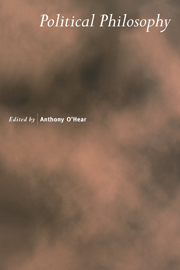Book contents
- Frontmatter
- Contents
- Preface
- Notes on Contributors
- Making the World Safe for Utilitarianism
- Innocent Before God: Politics, Morality and the Case of Billy Budd
- Democracy and Openness
- Rights and Human Rights
- Prerogative to Depart from Equality
- Casting the First Stone: Who Can, and Who Can't, Condemn the Terrorists?
- Against Egalitarianism
- Big Decision: Opting, Converting, Drifing
- The Epistemology of Unjust War
- High Culture, Low Politics
- Edmund Burke and the Anglo-American Tradition of Liberty
- The Politics of Emotion: Liberalism and Cognitivism
- Index of Names
High Culture, Low Politics
Published online by Cambridge University Press: 04 August 2010
- Frontmatter
- Contents
- Preface
- Notes on Contributors
- Making the World Safe for Utilitarianism
- Innocent Before God: Politics, Morality and the Case of Billy Budd
- Democracy and Openness
- Rights and Human Rights
- Prerogative to Depart from Equality
- Casting the First Stone: Who Can, and Who Can't, Condemn the Terrorists?
- Against Egalitarianism
- Big Decision: Opting, Converting, Drifing
- The Epistemology of Unjust War
- High Culture, Low Politics
- Edmund Burke and the Anglo-American Tradition of Liberty
- The Politics of Emotion: Liberalism and Cognitivism
- Index of Names
Summary
My theme at its most general is the relation between culture and power; at its most specific, the relation between a particular type of culture, so-called high culture, and two types of power, namely governmental power, and the related but more diffuse power prevailing in society at large.
So-called ‘high’ politics are often (and better) called statesman-ship, and are typically, though not invariably, international in scope. By the ‘low’ politics of my title I mean, not democracy specifically, but what politicians engage in at the domestic level, where popularity matters most. Democratic or not, most politics are perforce pretty low, and are justified only because they are preferable to despotism, which in its pure form signifies the absence of politics. Yet most real-life despotisms concede something to the political spirit, since they profit from their subjects' consent, endeavour to cultivate it, and are foolish if they think to dispense with it entirely. In politics proper, however, consent (like consensus) must be sought; in fact, wherever avowed and conflicting interests prefer to resolve matters through negotiation and agreement rather than through force, there we have something like politics. The conditions for consent will usually be ascertained through representative institutions. Their business is to transmit public opinion to the rulers, if those are separate from the representatives, or to act on it, where the representatives are themselves the rulers.
- Type
- Chapter
- Information
- Political Philosophy , pp. 189 - 212Publisher: Cambridge University PressPrint publication year: 2007



